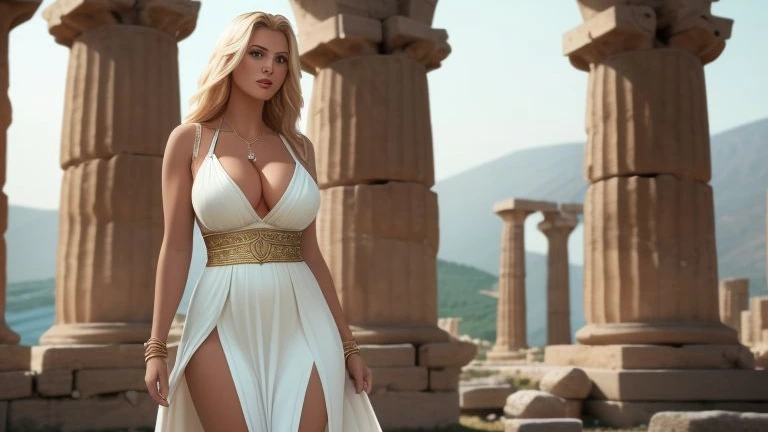In Greek mythology, Pandora, known as “All-Gifts,” was the first woman created by the gods.
According to Hesiod’s Theogony, Zeus, the king of the gods, ordered Hephaestus to fashion Pandora out of earth and bestowed upon her various gifts from the gods.
Pandora was given a jar that contained all manner of misery and evil. She was then sent to Epimetheus, who disregarded his brother Prometheus’ warning and married her.
Curiosity got the better of Pandora, and she opened the jar, unleashing the evils upon the earth.
Only hope remained inside, as the lid was closed before it could escape. The story of Pandora’s jar later became known as Pandora’s box, incorrectly translated by Erasmus in the 16th century.
Key Takeaways:
- The Greek myth of Pandora revolves around the story of the first woman created by the gods.
- Pandora was given a jar that contained all the evils of the world, and her curiosity led her to open it, releasing the troubles upon humanity.
- Hope remained trapped inside the jar, symbolizing the enduring struggle between good and evil in the world.
- The myth of Pandora has influenced various forms of art, literature, and popular culture throughout history.
- Pandora’s story serves as a cautionary tale about the consequences of one’s actions and the role of curiosity in bringing about misfortune.
The Myth of Pandora in Greek Literature
In Greek mythology, the story of Pandora is a fascinating and complex tale that has captured the imagination of people for centuries.
In this section, we will explore the role of Pandora in Greek mythology and delve into the various accounts of her story as described by Hesiod, the ancient Greek poet.
According to Hesiod’s works, Theogony and Works and Days, Pandora was created by Hephaestus, the god of blacksmiths, at the command of Zeus, the king of the gods.
Pandora’s purpose was to bring misfortune and suffering to mankind as a punishment for their theft of fire from the gods.
She was described as a “beautiful evil” who possessed cunning, deceitful nature, and a jar that contained all the evils of the world.
However, it was Pandora’s irresistible curiosity that ultimately led to the release of these evils upon the world.
In Works and Days, Hesiod expands upon Pandora’s attributes and the consequences of her actions.
He explains how she opened the jar out of curiosity, allowing the evils to escape and spread throughout the earth.
Only hope remained trapped inside the jar, symbolizing the everlasting struggle between good and evil.
The Influence of Pandora’s Myth
- The myth of Pandora has not only shaped Greek literature but has also influenced other cultures and religions.
- Many poets, dramatists, painters, and sculptors throughout history have been captivated by Pandora’s story, using it as inspiration for their works of art.
- Furthermore, the myth has become a cautionary tale, reminding us of the consequences of our actions and the importance of resisting temptation and curiosity.
The myth of Pandora is a timeless reminder of the complexities of human nature and the enduring struggle between good and evil.
It serves as a cautionary tale, warning us of the temptations and consequences that curiosity can bring.
Pandora’s story has left an indelible mark on Greek mythology and continues to capture the imagination of people around the world.
The Significance of Pandora’s Box

The story of Pandora’s box, or rather Pandora’s jar, holds great significance in Greek mythology.
This tale has permeated literature, art, and popular culture, becoming synonymous with the release of troubles or disasters.
However, it is important to note that the original myth refers to Pandora’s jar, not a box, with the mistranslation occurring in the 16th century by Erasmus.
Pandora’s jar, given to her as a gift from Zeus, contained all the plagues and evils that would afflict humanity.
When Pandora’s curiosity got the best of her, she opened the jar, unleashing these troubles upon the earth.
Only hope remained trapped inside, as the lid was closed before it could escape. This myth serves as a cautionary tale, illustrating the consequences of human curiosity and the enduring struggle between good and evil.
The story of Pandora’s box, or jar, has since become a powerful symbol. It represents the release of troubles or the consequences of one’s actions.
Throughout history, this symbolism has been depicted in various forms of art, literature, and even popular culture.
It serves as a reminder to exercise caution and consider the potential repercussions of our choices.
Pandora’s Impact on Humanity
When Pandora was created by the gods and introduced into the world, her impact on humanity was significant.
The gifts bestowed upon her, such as beauty, cunning, and a deceitful nature, were meant to bring misery and troubles upon mankind.
According to Hesiod, women are the descendants of Pandora and possess these same qualities, implying that they are responsible for the hardships and woes faced by men.
However, Hesiod also acknowledges that amidst the legacy of Pandora’s evils, there is a possibility of finding a good wife.
While the myth of Pandora may suggest a negative view of women, it is essential to understand that it reflects the cultural beliefs of ancient Greece.
The story serves as a reflection on the complex nature of women and their role in society.
It portrays the struggle between the inherent qualities bestowed upon them and their potential for good or evil.
Pandora’s influence on humanity encapsulates the timeless struggle between the forces of darkness and the glimmer of hope that remains trapped within.
The Impact of Pandora’s Gifts

Pandora’s gifts to mankind have left a lasting impression on the world. The combination of her beauty and cunning nature has influenced countless stories, artwork, and cultural representations.
This myth has served as a cautionary tale, warning individuals about the consequences of curiosity and the choices they make.
It reminds us that our actions can have far-reaching effects and that the pursuit of knowledge can lead to both enlightenment and despair.
- The allure of beauty: Pandora’s beauty has often been a symbol of temptation and desire. It represents the power that attractiveness holds over individuals, leading them astray and causing them to make rash decisions.
. - The cunning nature: Pandora’s deceitful nature serves as a reminder of the dangers of manipulation and dishonesty. It highlights the potential for individuals to use their intelligence and charm to achieve their own selfish goals, regardless of the consequences for others.
. - The legacy of Pandora: The legacy of Pandora’s gifts continues to shape our understanding of human nature. It reminds us of the eternal struggle between good and evil, and the choices we face in navigating the complexities of the world.
Conclusion
In conclusion, the myth of Pandora in Greek mythology serves as a cautionary tale about the consequences of human curiosity and the introduction of evils into the world.
As the first woman created by the gods, Pandora’s role in bringing misery and troubles upon humanity has left a lasting impact on Greek mythology.
The story of Pandora’s box or jar, although originally a mistranslation, has become a symbol representing the release of troubles or the consequences of one’s actions.
This myth has influenced various aspects of literature, art, and popular culture throughout history, showcasing the enduring struggle between good and evil.
Through Pandora’s gifts to mankind, including beauty, cunning, and a deceitful nature, the myth also reflects on the role of women in society.
While the myth suggests that women are responsible for bringing hardships, it also recognizes the possibility of finding goodness amidst the legacy of Pandora’s evils.
Overall, Pandora’s myth provides insights into the nature of curiosity, the consequences of our choices, and the eternal battle between hope and despair.
It continues to captivate our imagination and reminds us to be mindful of the power our actions hold.
Frequently Asked Questions
What did Pandora do to humans?
Pandora, according to Greek mythology, opened a jar (often referred to as Pandora’s box) releasing all the evils of humanity into the world, such as sickness, death, and many other unspecified evils. However, she closed the jar just in time to keep Hope inside.
What evils did Pandora release?
Pandora released various evils into the world, including but not limited to: sickness, death, turmoil, strife, and other forms of suffering and hardship.
Is Pandora evil or good?
Pandora herself is not inherently evil. She was created by the gods and given a jar containing all the evils of the world. Her actions led to the release of these evils, but she also preserved Hope by closing the jar before it could escape.
What are Pandora’s powers?
Pandora was not depicted with superhuman powers. However, she was endowed with various gifts from the gods, including beauty from Aphrodite, intelligence from Athena, and persuasion from Hermes. Her primary role in mythology is her connection to the jar of evils and the release of those evils upon humanity.
What was Pandora known for?
Pandora is best known for opening the jar (or box) that released all the evils into the world. This act is central to her story in Greek mythology and symbolizes the introduction of hardship and suffering to humanity.
What was Pandora’s secret?
Pandora’s secret was the contents of the jar she was given. She was unaware that the jar contained all the evils of the world. The only thing left inside after she opened it was Hope, which remained as a consolation for humanity.
Why is Pandora important in Greek mythology?
Pandora is important in Greek mythology because her story explains the origin of human suffering and hardship. Her tale is a fundamental myth that explores themes of curiosity, disobedience, and the unintended consequences of one’s actions. It also emphasizes the enduring presence of Hope amidst adversity.




